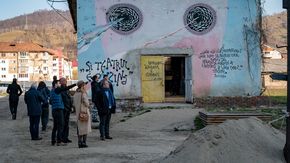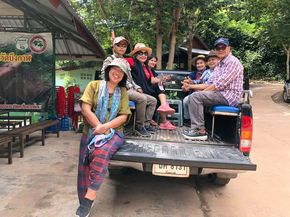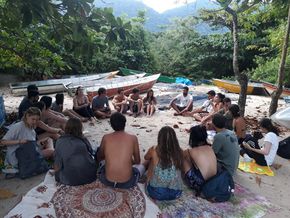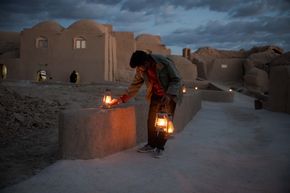For 20 years, !Khwa ttu has been providing training and jobs to marginalized, indigenous San from remote areas in South Africa, Namibia, and Botswana. Sensitive to indigenous contexts, an internship programme promotes access to further education, jobs and alternative livelihoods for young San.
!Khwa ttu is a San Culture and Education Centre, located on an 850 ha private nature reserve 70 km north of Cape Town. It is part of the Yzerfontein Conservation Area in the buffer zone of the West Coast National Park.
Today’s San are descended from indigenous hunter-gatherers who thrived in this region for thousands of years before being displaced by farmers. Genocide, loss of land, little access to natural resources and bans on hunting have left the San among the most marginalized people in the world. A report from the South African Department of Traditional Affairs released in 2021 found that the socio-economic status of San is worse than imagined. Access to basic education is very limited. School drop-out rates are high. Very few of the San undergo further education.
Elisabeth is a young San from a small town near the Namibian border. “I studied tourism in Upington. But I could not proceed with my studies because there was no money. So I applied for the internship at !Khwa ttu”, she narrates. Today she works in !Khwa ttu’s kitchen. So does Alister who is from a small place in the South African part of the Kalahari. “There are no jobs in the Kalahari, no opportunities”, he says. However, after his internship with !Khwa ttu he got a permanent contract as a kitchen assistant. He is able to send money to his family every month.
“Food from the Ancestors”
The kitchen where Elisabeth and Alister are working has created a menu that not only revives cultural heritage, but is also very mindful of the need for sustainability. Much of our effort goes into sourcing beverages and produce from the land, local artisans and responsible suppliers. So each dish and drink tell a unique story.
A place of hope, opportunity, and growth
As hunter-gatherers, traditional San culture was closely linked to nature. San are known for their superb tracking skills and knowledge of plants and their uses. Sadly, today most San can no longer live as hunter-gatherers and traditional knowledge is being lost. At !Khwa ttu we have learned that it is possible to create livelihoods aligned with San heritage. These livelihoods are linked to the protection, restoration and sustainable use of natural and cultural resources.
Our heritage studies help interns gain a sense of identity. !Khwa ttu offers them a relatively long period in a safe place where their needs are met. In our experience, many young interns have little knowledge of their heritage or the different groups of San living in Southern Africa. Today, there are around 130,000 San, a diverse people speaking 13 different languages. !Khwa ttu is a place where San groups can gather, share their stories, and meet other San. “We have !Xu, Khwe and ǂKhomani San working at !Khwa ttu,” says Alister and points to their preparations for 24 September when !Khwa ttu will celebrate Heritage Day, a national holiday in South Africa. “So we come together and talk about what we will do. The interns who are here will be dancing.”
!Khwa ttu’s internship programme
!Khwa ttu trains 16-20 young San from the greater Kalahari basin each year. The internship programme includes a combination of practical training (four days per week), balanced with two days of theoretical study per week. This practical training improves their chances of obtaining work in farm maintenance, gardening, housekeeping, restaurant, kitchen, guiding, reception, administration or museum. Guiding focuses on natural and cultural heritage site guiding – sharing San culture with visitors.
Theoretical studies include classes on nature, culture, ethnobotany, language, IT, and sustainable livelihoods. We also offer short courses by external trainers, e.g. on first aid, HIV/Aids, rock art, heritage preservation, and intellectual property. Studies on entrepreneurship help interns to plan their own small business which they could start in their community to support income generation. For example, there were interns from Namibia who started small bakery and basket making businesses in their areas, where jobs are scarce. Unemployment is over 90 percent in some San communities.
We are also building a network of alumni in communities, so that they can support each other. We also assist excellent interns in applying for bursaries to obtain professional qualifications. For example, our training facilitator is a !Khwa ttu alumni who studied further to become a highly qualified and certified field guide.
Conservation at !Khwa ttu
From a palaeobotanist we learned about plants on the farm that were foraged by San thousands of years ago. With her help we were able to develop a 'Food from our Ancestors' tour. We cultivate the plants we want to use where they grow naturally. Our restoration project is located at the highest point on the farm in an area protected for conservation and rehabilitation. It has trails for walking and mountain biking.
The fence around the restoration area intrigues our visitors, creating an opportunity to raise awareness of the need to protect it from bigger game (e.g. Eland, Zebra) and its historical role in sustaining ancient hunter-gatherers indigenous to southern Africa. For guests, the restoration and sustainable foraging activities make for a wonderful story and a unique culinary experience.
In undertaking this work, we contribute to San cultural heritage restitution, thereby leaving San with a deeper sense of identity as an indigenous culture which has much to offer as humanity pursues a more equal, respectful and sustainable way of life.
Michael Daiber is the General Manager of !Khwa ttu, a South African Non-Profit Organisation registered in 2004. !Khwa ttu won the TO DO Award Socially Reponsible Tourism 2018.


![[Translate to english:] Khwa ttu Trommler](/fileadmin/tourismwatch/_processed_/2/0/csm_2-Titelbild__c_Khwa_ttu_Credits%40KarinSchermbrucker_1f90ee8c56.jpg)




